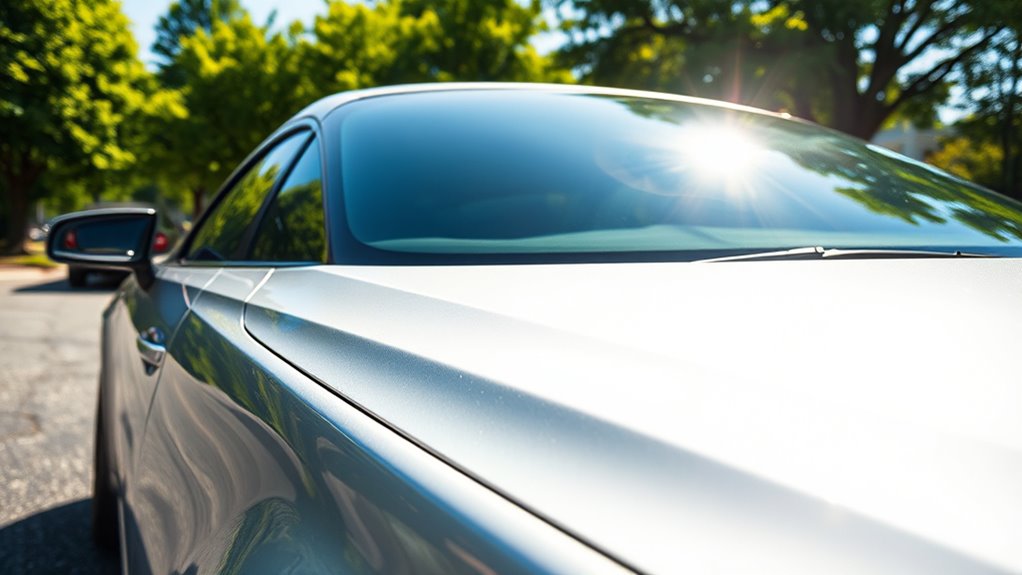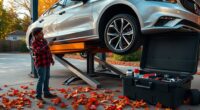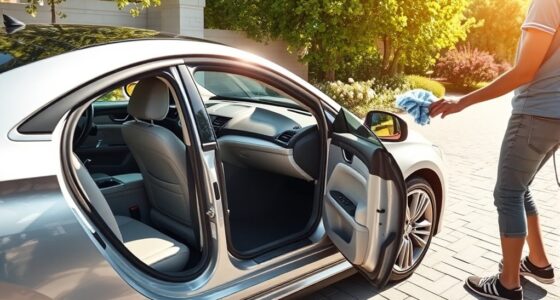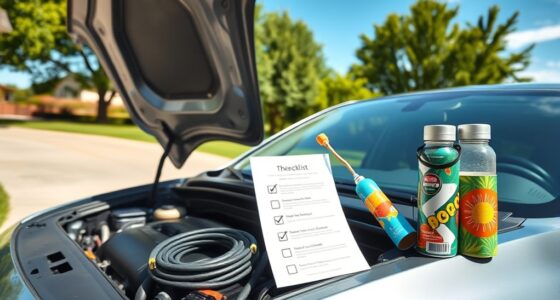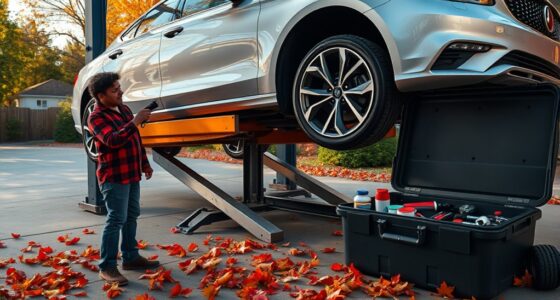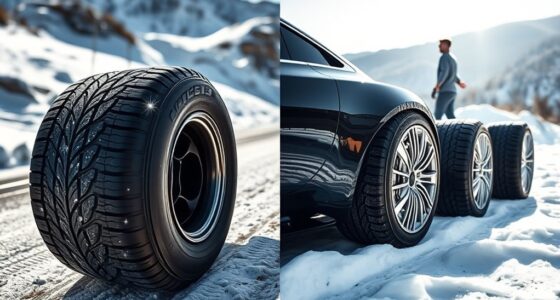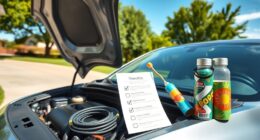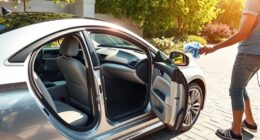Summer heat can cause your tires to overinflate, increasing the risk of blowouts and uneven wear, while underinflation leads to poorer fuel efficiency and faster tire deterioration. High temperatures also raise the interior temperature, damaging dashboards and electronics if you leave your vehicle under the sun. Using sunshades, parking in shaded areas, and maintaining proper tire pressure help protect your car’s safety and longevity. Keep going to discover more tips to keep your vehicle in top shape this summer.
Key Takeaways
- High temperatures cause tire air to expand, risking overinflation and potential blowouts.
- Summer heat accelerates tire wear, especially if tire pressure is under or over the recommended levels.
- Excessive heat can damage interior materials, electronics, and wiring, leading to cracking and fading.
- Parking in shaded areas and using sunshades help protect the vehicle interior from heat damage.
- Regular maintenance, including fluid checks and cooling system checks, ensures vehicle reliability during hot weather.
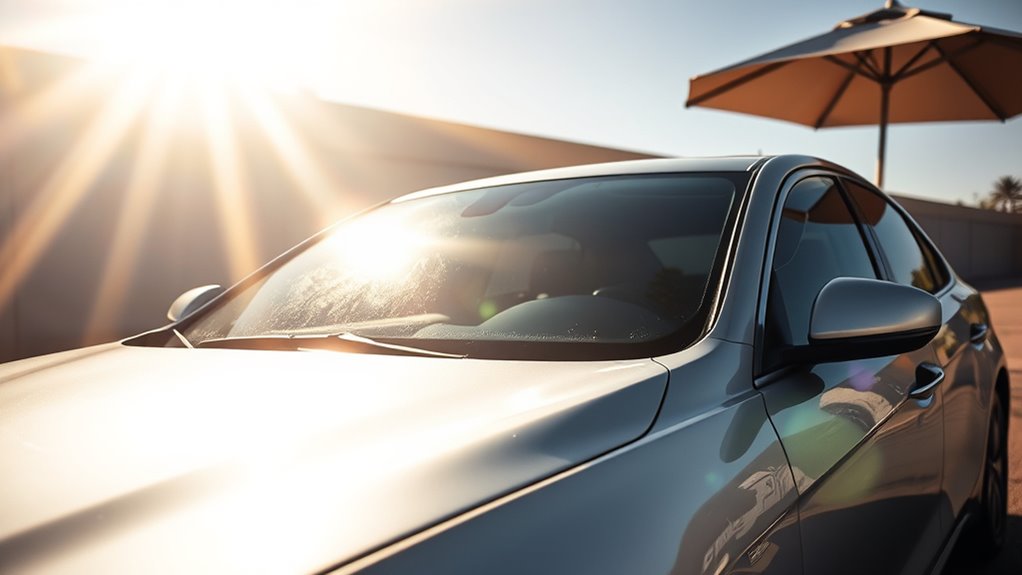
Have you ever wondered how summer heat impacts your car? The rising temperatures can do more than just make you sweat; they can markedly affect your vehicle’s performance and longevity. One of the key issues during hot months is tire pressure. When the sun beats down, the air inside your tires heats up and expands, causing the pressure to rise. This isn’t just a minor fluctuation; it can lead to overinflated tires, which are more prone to blowouts and uneven tread wear. Many drivers overlook checking their tire pressure during summer, but it’s vital to keep it at the recommended level. Underinflated tires, on the other hand, can cause poor fuel efficiency and uneven wear, both of which become more problematic in the heat. Regularly monitoring your tire pressure, especially before long drives, helps guarantee your tires stay in ideal condition, providing better grip and safety on the road.
The interior of your car also faces challenges from the summer heat. When parked under the sun, the inside temperature can soar, making your vehicle uncomfortable and risking damage to interior materials. To combat this, you should use sunshades or window visors to block direct sunlight and keep the cabin cooler. When you get in, the air inside might feel stifling, but turning on the air conditioning system early can help. Interior cooling isn’t just about comfort – it’s about protecting your car’s interior surfaces and electronics from the damaging effects of excessive heat. Prolonged exposure to high temperatures can cause dashboard cracking, fading upholstery, and damage to your car’s wiring. Keeping your car ventilated and cool minimizes these risks and makes your driving experience more pleasant.
Another way to safeguard your vehicle during the summer is to park in shaded areas whenever possible. This simple step helps prevent the interior from heating up as much and reduces the strain on your AC system. Additionally, consider using a windshield sunshade when parking outside for extended periods, which reflects sunlight and keeps the car’s interior temperatures lower. Regular maintenance checks are vital during hot months, including fluid levels, coolant, and air conditioning systems, ensuring your vehicle runs smoothly despite the heat.
Frequently Asked Questions
Can Summer Heat Cause Tire Blowouts?
Summer heat can indeed cause tire blowouts. As temperatures rise, heat expansion increases tire pressure, putting extra stress on your tires. If your tire pressure is already low or uneven, the heat can make the situation worse, leading to a blowout. To prevent this, regularly check your tire pressure, especially during hot days, and verify your tires are properly inflated to handle the heat safely.
How Does Heat Affect My Car’S Battery Life?
Did you know high temperatures can reduce your car’s battery life by up to 50%? Heat accelerates battery degradation, causing your battery to lose capacity faster. It also puts stress on your electrical system, increasing the risk of failure. During summer, you might notice your car struggles to start or electrical components malfunction. Take care of your battery by parking in the shade and getting regular checks to extend its lifespan.
Does High Temperature Impact Engine Oil Performance?
High temperatures can impact your engine oil’s performance by decreasing its viscosity, making it thinner and less effective at lubricating. You might notice increased oil evaporation, which can lead to lower oil levels and reduced engine protection. As heat rises, your engine needs proper oil to prevent wear and tear, so regular checks and using the right oil viscosity help make sure your engine stays well-lubricated and protected during hot weather.
Are Certain Car Colors More Heat-Resistant?
A picture is worth a thousand words, and that’s true when choosing car paint. Lighter colors reflect more sunlight, reducing heat absorption, making them more heat-resistant. Darker car paint absorbs more heat, causing the vehicle to get hotter. If you want to beat the summer heat, opt for white, silver, or beige, as they reflect sunlight better. Your choice of color can truly keep your car cooler on scorching days.
How Quickly Can Summer Heat Damage Interior Upholstery?
Summer heat can damage your car’s interior upholstery surprisingly fast, sometimes within just a few months of constant sun exposure. High temperatures cause the upholstery to fade, making colors look dull and worn out. Over time, the heat weakens the material, leading to cracking and tearing. To protect your interior, use sunshades, park in shaded areas, and regularly clean and condition your upholstery to minimize these damaging effects.
Conclusion
Remember, a little prevention goes a long way. During hot summer days, taking simple steps like parking in the shade, using sunshades, and checking your coolant can keep your car running smoothly. Don’t wait until it’s too late—hot weather can cause serious damage if you’re not careful. As the saying goes, “A stitch in time saves nine.” Stay proactive this summer to protect your car and keep it in top shape.
